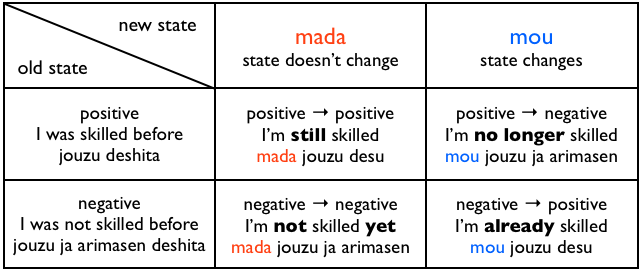Vocabulary
English
because
! (for sure!)
already; no longer
store
department store
late; slow
why? How come?
you’re welcome
to do (humble)
masu (formal)
dict (casual)
-te (imperative)
to see
masu (formal)
dict (casual)
-te (imperative)
to be open
masu (formal)
dict (casual)
-te (imperative)
to be closed
masu (formal)
dict (casual)
-te (imperative)
romaji
kara
yo
mou
mise
depaato
oso-i
dou-shite
dou-itashimashite
itashi-masu
itasu
itashite
mi-masu
miru
mitte
aki-masu
aku
aite
shimari-masu
shimaru
shimatte
kana
から
よ
もう
みせ
デパート
おそい
どうして
どういたしまして
いたします
いたす
いたして
みます
みる
みって
あきます
あく
あいて
しまります
しまう
しまって
kana
店
見ます
見る
見って
- the word for ‘stores’ used in the recordings, ‘o-mise’, is ‘mise’ (store) with the honorific ‘o-‘.
- ‘yo’ is a spoken exclamation mark, i.e., ‘!’; a verbose translation would be ‘I’m sure!’ or ‘that’s for sure!’.
- ‘oso-i’ means both ‘slow’ and ‘late’, in the same way that ‘haya-i’ means both ‘fast’ and ‘early’.
- ‘mitte’ means ‘see’; it can mean ‘to try’, as in ‘see if you can do this’, i.e., ‘try to do this’
- ‘itasu’ is the humble version of ‘suru’, both meaning ‘to do’
Sample sentences
Eng: because it is already late.
lit: already late is because.
formal
mou oso-i desu kara.
もう おそい です から。
もうおそいですから。
casual
mou oso-i da kara.
もう おそい だから。
もうおそいだから。
Eng: try to say it, please (see whether you can say it, please)
lit: say it, see it, please
formal
to itte, mitte kudasai.
と いって、いって ください。
と言って、見って下さい。
Comments
The following comments explain some of the grammar in more detail.
Adverbs
dou-shite – どうして
The ‘dou’ in ‘dou shite’ means ‘how’; hence, a good English translation of ‘dou shite?’ meaning ‘why?’ would be ‘how come?’. As in the English ‘how come?’, ‘dou shite’ is casual; the formal way to ask ‘why?’ is ‘naze?’.
This is one of the few situations in which a shorter word is actually more formal than the longer one.
There are many ways to ask ‘why?’; in each case, the single word can be followed by ‘desu ka’ to make the request even more polite:
why?
formal
casual
more casual
why?
how come?
in what way?
naze (desu ka)?
dou-shite (desu ka)?
nande (desu ka)?
なぜ?
どうして?
なんで?
mou – もう
‘mou’ is the other side of the coin of the adverb ‘mada’, introduced in Lesson 3. We are going to repeat some of the material about ‘mada’ here, to make clear how it differs from ‘mou’. japanesemeow.com has a great page about this.
mada
indicates that there has not been any change in the state, for either positive or negative states:
positive state – still:
mada jouzu desu.
mada genki desu.
I’m still skilled (I was skilled before, and I’m skilled now).
I’m still healthy (I was healthy before, and I’m healthy now).
negative state – not yet:
mada jouzu ja nai.
mada genki ja nai.
I’m not skilled yet (I wasn’t skilled before, and I’m not skilled now).
I’m not healthy yet (I wasn’t healthy before, and I’m not healthy now).
mou
indicates that there has been a change in the state, for either positive or negative states:
positive state – already:
mou jouzu desu.
mou genki desu.
I’m already skilled (I was not skilled before, but I’m skilled now).
I’m already healthy (I was not healthy before, but I’m healthy now).
negative state – no longer:
mou jouzu ja nai.
mou genki ja nai.
I’m no longer skilled (I was skilled before, but I’m not skilled now).
I’m no longer healthy (I was healthy before, but I’m not healthy now).
Using the example of the recordings:
particles
yo – よ
We can think of the particles は and か playing the role of question marks after the topic and after the verb, respectively:
English
wine ? how about it ?
romaji
wain wa dou desu ka
Japanese
ワインは どう ですか
And in the same way, we can think of the particles が and よ as playing the role of exclamation marks after the topic and after the verb, respectively.
English
wine ! I want some !
romaji
wain ga hoshii desu yo
Japanese
ワインが ほしい ですよ
They are not interchangeable, though. は and が apply to the topic, while か and よ apply to the verb. We can have が after the verb; however, it would not be playing the role of an exclamation mark but, instead, it would have a softening role:
English
wine ! I would like some
romaji
wain ga hoshiin desu ga
Japanese
ワインが ほしいん ですが
Sometimes females would add わ (wa) to the よ particle, or combine them with ね, e.g., all of the following mean ‘The wine is delicious!’:
romaji
wain ga oishii desu yo
wain ga oishii desu wa
wain ga oishii desu wa-yo
wain ga oishii desu wa-ne
wain ga oishii desu wa-yo-ne
Japanese
ワインが おいしい ですよ
ワインが おいしい ですわ
ワインが おいしい ですわよ
ワインが おいしい ですわね
ワインが おいしい ですわよね
